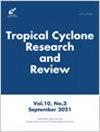Ensemble deep learning models for tropical cyclone intensity prediction using heterogeneous datasets
IF 4.1
4区 地球科学
Q3 METEOROLOGY & ATMOSPHERIC SCIENCES
引用次数: 0
Abstract
The prediction of the Tropical Cyclone (TC) intensity helps the government to take proper precautions and disseminate appropriate warnings to civilians. Intensity prediction for TC is a very challenging task due to its dynamically changing internal and external impact factors. We proposed a system to predict TC intensity using CNN-based ensemble deep-learning models that are trained by both satellite images and numerical data of the TC. This paper presents a thorough examination of several deep-learning models such as CNN, Recurrent Neural Networks (RNN) and transfer learning models (AlexNet and VGG) to determine their effectiveness in forecasting TC intensity. Our focus is on four widely recognized models: AlexNet, VGG16, RNN and, a customized CNN-based ensemble model all of which were trained exclusively on image data, as well as an ensemble model that utilized both image and numerical datasets for training. Our analysis evaluates the performance of each model in terms of the loss incurred. The results provide a comparative assessment of the deep learning models selected and offer insights into their respective prediction loss in the form of Mean Square Error (MSE) as 194 in 100 epochs and execution time 1229 s to forecasting TC intensity. We also emphasize the potential benefits of incorporating both image and numerical data into an ensemble model, which can lead to improved prediction accuracy. This research provides valuable knowledge to the field of meteorology and disaster management, paving the way for more resilient and precise TC intensity forecasting models.
基于异构数据集的热带气旋强度预测集成深度学习模型
预测热带气旋强度有助政府采取适当的预防措施,并向市民发出适当的警告。由于其内部和外部影响因素都是动态变化的,因此强度预测是一项非常具有挑战性的任务。我们提出了一个系统,使用基于cnn的集成深度学习模型来预测TC强度,该模型由TC的卫星图像和数值数据训练。本文对CNN、递归神经网络(RNN)和迁移学习模型(AlexNet和VGG)等几种深度学习模型进行了全面的研究,以确定它们在预测TC强度方面的有效性。我们的重点是四个广泛认可的模型:AlexNet, VGG16, RNN和一个定制的基于cnn的集成模型,所有这些模型都是专门在图像数据上训练的,以及一个利用图像和数字数据集进行训练的集成模型。我们的分析根据所造成的损失来评估每种模型的性能。结果提供了对所选深度学习模型的比较评估,并以均方误差(MSE)的形式提供了各自的预测损失,即100个epoch的均方误差(MSE)为194,执行时间为1229 s来预测TC强度。我们还强调了将图像和数值数据合并到集成模型中的潜在好处,这可以提高预测精度。这项研究为气象和灾害管理领域提供了宝贵的知识,为更有弹性和更精确的TC强度预测模型铺平了道路。
本文章由计算机程序翻译,如有差异,请以英文原文为准。
求助全文
约1分钟内获得全文
求助全文
来源期刊

Tropical Cyclone Research and Review
METEOROLOGY & ATMOSPHERIC SCIENCES-
CiteScore
4.60
自引率
3.40%
发文量
184
审稿时长
30 weeks
期刊介绍:
Tropical Cyclone Research and Review is an international journal focusing on tropical cyclone monitoring, forecasting, and research as well as associated hydrological effects and disaster risk reduction. This journal is edited and published by the ESCAP/WMO Typhoon Committee (TC) and the Shanghai Typhoon Institute of the China Meteorology Administration (STI/CMA). Contributions from all tropical cyclone basins are welcome.
Scope of the journal includes:
• Reviews of tropical cyclones exhibiting unusual characteristics or behavior or resulting in disastrous impacts on Typhoon Committee Members and other regional WMO bodies
• Advances in applied and basic tropical cyclone research or technology to improve tropical cyclone forecasts and warnings
• Basic theoretical studies of tropical cyclones
• Event reports, compelling images, and topic review reports of tropical cyclones
• Impacts, risk assessments, and risk management techniques related to tropical cyclones
 求助内容:
求助内容: 应助结果提醒方式:
应助结果提醒方式:


